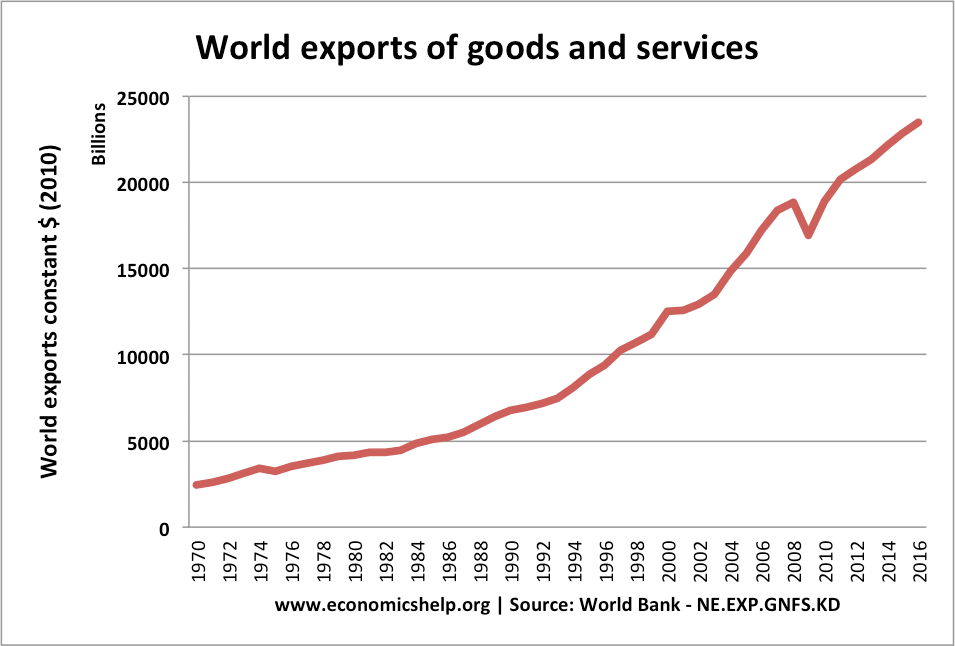The World Trade Organisation (WTO) is committed to improving free trade amongst its member countries. However, its role has been controversial – creating polarised views.
These are some of the criticisms of the WTO
- Free Trade benefits developed countries more than developing countries. It is argued, developing countries need some trade protection to be able to develop new industries; this is important to be able to diversify the economy. It is known as the infant industry argument. Many developed economies used a degree of tariff protection in their development phase. Economist Ha Joon Chang argues WTO trade rules are like ‘pulling away the ladder they used themselves to climb up’ (Kicking away the ladder at Amazon)
- Most favoured nation principle. This is a core tenant of WTO rules – countries should trade without discrimination. It means a local firm is not allowed to favour local contractors. It is argued this gives an unfair advantage to multinational companies and can have costs for local firms and the right of developing economies to favour their own emerging industries.
- Failure to reduce tariffs on agriculture. Free trade is not equally sought across different industries. Both the US and EU retain high tariffs on agriculture, this hurts farmers in developing economies who face tariff protection
- Diversification. Arguably developing countries who specialise in primary products (e.g. agricultural products) need to diversify into other sectors. To diversify they may need some tariff protection, at least in the short term. Many of the existing industrialised nations used tariff protection when they were developing. Therefore, the WTO has been criticised for being unfair and ignoring the needs of developing countries.
- Environment. Free trade has often ignored environmental considerations. e.g. Free trade has enabled imports to be made from countries with the least environmental protection. Many criticise the WTO’s philosophy that the most important economic objective is the maximisation of GDP. In an era of global warming and potential environmental disaster, increasing GDP may be the least important. Arguably the WTO should do more to promote environmental considerations.
- Free trade ignores cultural and social factors. Arguably a reasonable argument for restricting free trade is that it enables countries to maintain cultural diversity. Some criticise the WTO for enabling the domination of multinational companies which reduce cultural diversity and tend to swamp local industries and firms.
- The WTO is criticised for being undemocratic. It is argued that its structure enables the richer countries to win what they desire; arguably they benefit the most.
- Slow progress. Trade rounds have been notoriously slow and difficult to reach an agreement.
- WTO becoming overshadowed by TIPP agreements which fall outside the purvey of WTO rules.
Evaluation – response to these criticisms
In response to these criticisms, we could mention.
- Failure of countries to agree tariff reduction in agriculture is not the fault of WTO, but countries themselves.
- Free trade and growth of exports have been an important factor in raising living standards, especially in south-east Asia, which has benefitted from the remarkable growth of world trade.

- The growth of world trade has helped reduce absolute poverty.
- In recent years, the WTO has made more efforts to consider the situation of developing economies. Recent rounds have put pressure on developed countries to accelerate removing restrictions on imports from the least-developing countries.
- The WTO has over 160 members representing 98 percent of world trade. Over 20 countries are seeking to join the WTO.
- WTO has been given credit for helping to avoid trade disputes.
See also:

That was really very helpful. Thank-you so much to make my project a great success. When I was tensed regarding economics project on WTO, I got sufficient infos from here.
let me ask a question:
Has the WTO been useful only for the developed countries or also for the developing countries? i feel so because the main crux of today’s trade, in my opinion, is the WTO and its principles and policies, to a far extent, have discriminated the developing countries. Apart from the fact that today the WTO has gained much wider ambivalence and prospective, it has been supportive only to the developed nations……….
IS MY CONCEPT RIGHT OR WRONG??????????
Thanks alot, this helped alot to my project Im having very soon 🙂